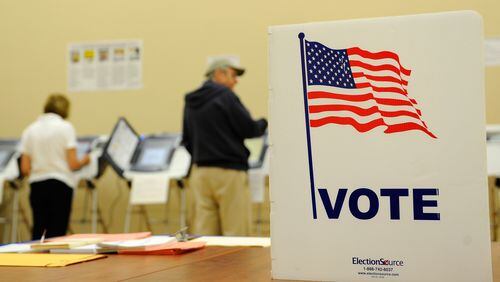Georgia for the first time in nearly two decades may field an independent candidate on its presidential ballot this November after a federal judge ruled a portion of the state’s ballot access laws violated the U.S. Constitution.
The state plans to appeal the March 17 ruling by U.S. District Judge Richard Story, which significantly lowers the number of signatures required to petition to get on the state’s presidential ballot — from tens of thousands to 7,500.
But, for now, "it's a dramatic 85 percent reduction in the requirement," said Garland Favorito, the elections director for the Georgia Constitution Party, which with the Georgia Green Party sued the state over the rules in 2012. "It's one of the few successes we've had."
Favorito said his party, which believes in limited government, expects to choose a candidate for the ballot in mid-April. The environmental Green Party is expected to do the same this spring. Any independent presidential candidate faces a July 12 deadline to file a petition to have his or her name placed on the state’s November ballot.
While the Democratic and Republican parties are not required to petition because they are essentially grandfathered into the current system, Georgia has long held that independent or so-called “third-party” candidates could not automatically be placed on the presidential ballot unless the party had a statewide candidate in the previous general election who received votes equal to at least 1 percent of the total registered voters in the state.
If not, the law said a candidate must otherwise have collected signatures from at least 1 percent of the registered voters who were eligible to vote in that race in the previous election. In 2012, when the lawsuit was filed, that would have amounted to at least 50,334 signatures.
Both the Constitution and Green parties told Story that if the law remained the same, they faced a minimum requirement of 50,334 signatures but would likely have to get at least 70,000 signatures to pass muster.
The state, in fighting the suit, had argued that the parties should have to show what Story called “a modicum of support,” and it said that lower signature requirements could result in voter confusion and a crowded presidential ballot.
And while the state plans to appeal the ruling, a spokeswoman for Georgia Secretary of State Brian Kemp — whose office oversees elections — said officials did not expect significant disruption.
“Given that the order only applies to presidential candidates, this order should not have a significant effect on the administration of this year’s elections,” spokeswoman Candice L. Broce said.
The last time a third-party or independent candidate qualified for Georgia’s presidential ballot was 2000, when Pat Buchanan qualified for the Reform Party. Ross Perot did the same as an independent presidential candidate in 1992 and 1996.
Story, in his ruling, said he would prefer for the state Legislature to set new signature requirements. The soonest that can happen is next year, since lawmakers finished their annual legislative session March 25. The judge also said that, in comparing the requirements of other states, 7,500 signatures still makes Georgia one of the tougher states to get on the ballot.
Two-thirds of states in the U.S. require fewer than 7,500 signatures, including neighbors such as Alabama. Georgia’s law went into effect in 1986.
The ruling only applies to the presidential ballot. For other offices, including congressional and state legislative seats, the state sets a higher signature requirement for independent parties of 5 percent of the total number of registered voters eligible to vote in the last election. Both Favorito and the Green Party, however, said they may soon take legal aim at that, too.
In a statement released by the party, state Green Party Co-chairman Bruce Dixon praised the March ruling but added, “in the future we hope to force that door open further and to extend this right to Georgia voters electing members of Congress, the legislature and constitutional and county offices.”
About the Author







